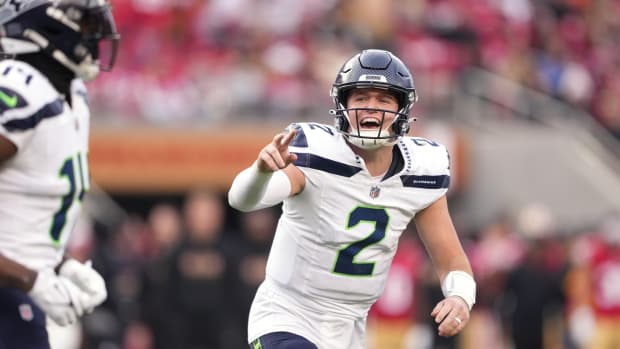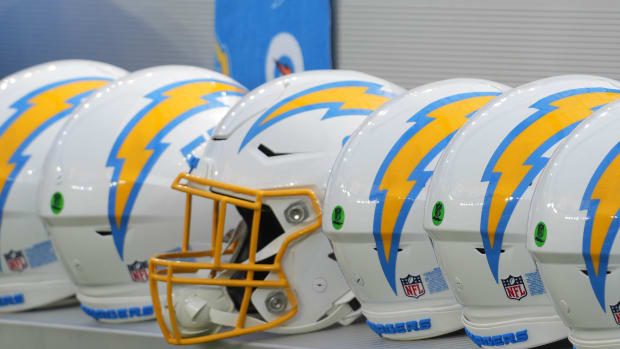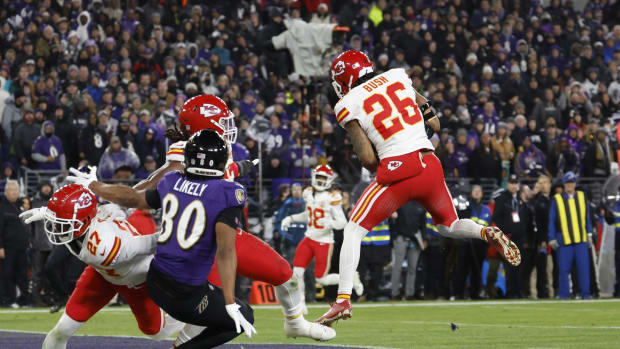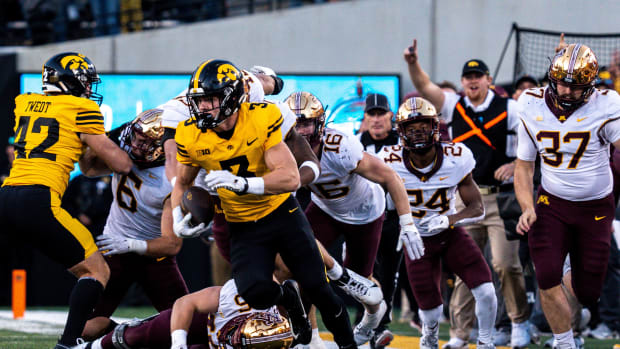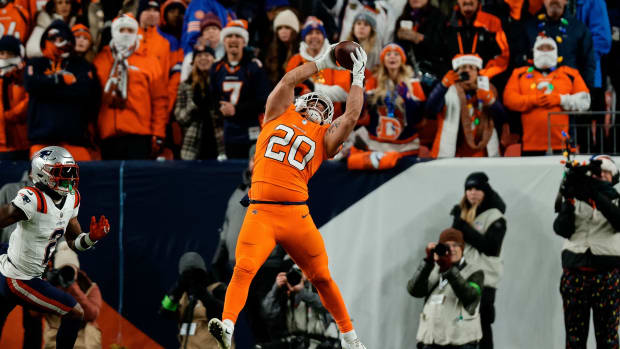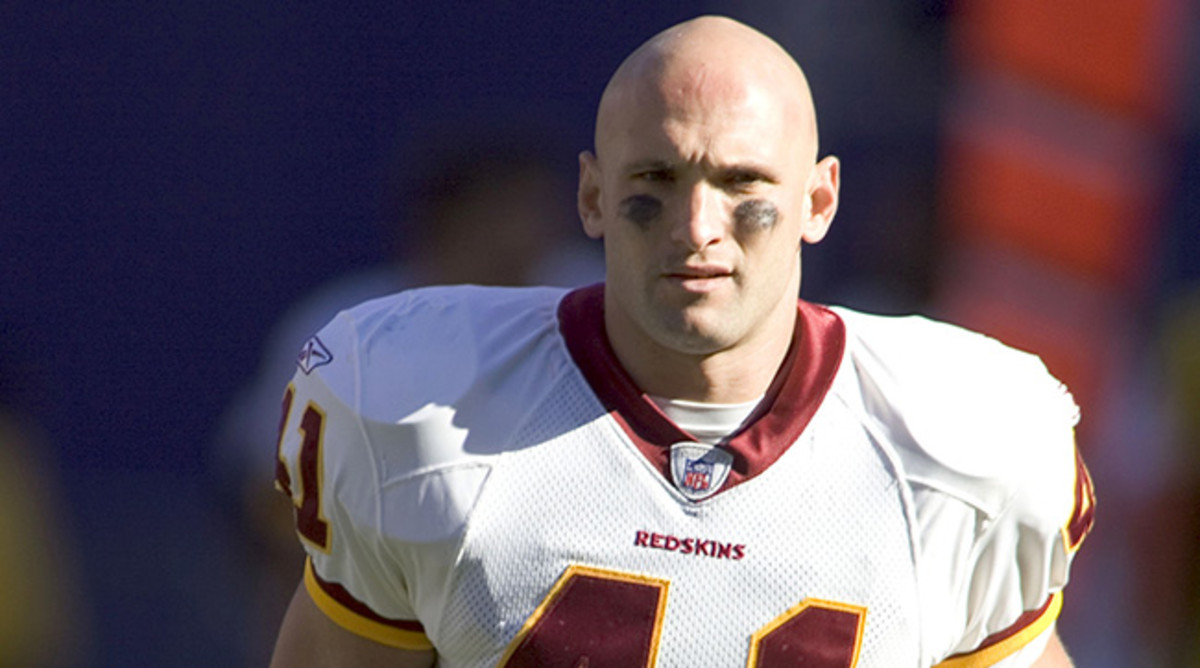
‘I’ll Always Be the Guy Taken Right Before Tom Brady’
CHICAGO — Matt Bowen spent the second day of the 2000 NFL draft at his childhood home in Glen Ellyn, a Chicago suburb. The long, drawn-out wait of a late-round pick is a common tale, and while the details vary they all involve an overwhelming amount of stress. For Bowen, a defensive back from Iowa, the third round flipped to the fourth, then the fifth. He fielded calls from the Cowboys and Steelers, who passed on him again, then again. Bowen became detached at the small family party, excusing himself to go upstairs. He closed the door to his parents’ bedroom and questioned everything. Am I good enough? What could I have done differently at Iowa? Should I have trained more for my 40-yard dash?
The phone rang. Mike Martz was on the line, and this time it was for real: The St. Louis Rams are drafting you with the 198th pick in the sixth-round.
As Bowen heard the echoes of celebration downstairs, he stayed fixated on the ESPN broadcast. The ticker had already been updated with Bowen’s selection, and the one after it: Pick No. 199, New England Patriots: Tom Brady, QB, Michigan. Bowen’s old Big Ten foe.
“I remember thinking to myself, ‘Oh, O.K.,’” Bowen says, “‘So that’s where Tom ended up.’”
It’s been nearly 17 years since that draft. Brady just won his record fifth Super Bowl title. He has declared that he plans to play into his mid-40s. Bowen has already been out of the league for nearly a decade.
He is back in the Chicago suburbs, at a coffee shop a few miles from his home. While Brady’s ascension is that of a legend, Bowen’s seven-year, four-stop, three-cut grind is a more typical snapshot of an NFL player’s career arc, and a true success story relative to most sixth-round picks. Bowen and Brady intersected several times, and though Bowen zigged while Brady zagged, it wasn’t until this year that the paths again aligned—metaphorically—as both men achieved validation.
But Bowen’s story is worth visiting for this reason: There were 198 players taken before Tom Brady in 2000. Thirty-one teams passed over the future Hall of Famer; many of them did so six times. Six other quarterbacks were taken before him. Heck, three kickers were taken before him.
“But for the rest of my life, I’ll always be known as the guy taken right before Tom Brady,” Bowen says, smirking. “It’s been attached to me. It’s something you talk about at parties. It’s kind of become a thing.”
* * *

After getting cut by the Rams during his second season, Bowen carved out roles in Green Bay, Washington and Buffalo.
Brian Bahr/Getty Images; Larry French/Getty Images; Mark Konezny/Getty Images
Bowen arrived at Iowa as a quarterback. Before his sophomore year, he met with Hawkeyes legend Chuck Long, then the team’s defensive backs coach. “Do you want to play on Sundays?” Long asked. “Then come play for me.” And so Bowen flipped sides and thrived—for the most part. In 1998, the Hawkeyes hosted No. 25 Michigan on a drizzly Saturday at Kinnick Stadium. Brady was under center for the Wolverines, and threw the only touchdown in a 12-9 UM victory. “I’m still pissed about this play,” Bowen says. “I remember everything. He beat me on an inside slant route to Tai Streets. If I would’ve kept my shoulders square, instead of guessing, it would have been fine. But Tom smoked me.”
A journalism major, Bowen spent free time working for The Daily Iowan, writing a weekly column during football season and covering the track beat in the spring. The NCAA, of course, prevented him from making any significant salary from his work—only $10 per article. But, to be fair, “that’s a lot of beer money in Iowa City,” he says.
His rookie year, Bowen started two games at safety for St. Louis, but his value was on special teams. “That’s how I made the league, that’s how I stayed in the league,” he says. But his second season-opener sent the Rams to visit the Eagles on the unforgiving turf of old Veterans Stadium. He stepped on one of the seams where they lay turf down over the base paths, breaking his foot. In Week 6, the Rams asked if Bowen could run. “I was 23, I didn’t know any better,” he says. “I wasn’t 100 percent, but I ran because they asked me to. And so right after I run, they say I’m healthy, and then they cut me.”
So began a workout tour: Fly to Green Bay, home for a day, fly to Phoenix then San Francisco then Seattle, and from there a red-eye to Boston. Bowen, by this point well out of clean clothes, was picked up at Logan Airport and driven to Foxborough by a quality control assistant. He worked out immediately upon arriving. “My foot is not healed,” Bowen remembers. “But to stay in the league, you have to take risks. So there I was, in front of Bill Belichick and Scott Pioli, trying my best.” Bowen’s college coach, Kirk Ferentz, has a relationship with Belichick from their days with the Browns, and Bowen felt it was his best of the five tryouts. Bowen’s agent reported back that the Patriots were very interested. Pioli called after reviewing scans from Massachusetts General Hospital: “Sorry, you’re not healthy, we can’t sign you.”
A few months later Brady led the Patriots past the Rams in Super Bowl XXXVI, the franchise’s first championship.
* * *
Bowen did latch on with a team later in 2001, signing with Green Bay. It was a spot he liked. His longtime girlfriend, Shawn, was now his wife, and she was only a short drive away in Illinois. He practiced with Brett Favre every day. After joining the Packers midseason in 2001, he signed a restricted free-agent deal to stay in 2002, which led to his most memorable professional highlight.
“I had four interceptions in my career, and the other ones… look, you’re probably not going to talk about Quincy Carter, Doug Johnson, Jake Delhomme,” Bowen says. “But when you intercept the greatest quarterback of all time…”
Visiting Foxborough in Week 6, the Packers were protecting a 14-3 lead late in the first half. Brady was looking to put up points before halftime. Coming out of the two-minute warning, a false start penalty had turned a third-and-3 into a third-and-8 from New England’s 43.
“We were playing Cover 2—called it Double Zone,” Bowen says. “Deion Branch on the dig route. I’m taught to play top-down, meaning, I play over the top of everything and drive down on intermediate routes. Brady locks in on Branch. I got a great jump on the ball and we both get our hands on the throw at the catch point. The ball kind of pops up. So, I just stick my hand back to get a piece of it and pulled it in. Some real luck involved, but I'll take it. That’s my first career interception.”
The ball came home with Bowen—it rode in the empty seat next to him on the flight home. Now it’s on display in Bowen’s home office. He has four sons now, and whenever they bring a new friend over it’s the first thing they ask to look at. (Bowen’s sons, by the way, have become Patriots’ fans. “They like Gronk a lot, and so therefore they like Brady. They were definitely rooting for him in the Super Bowl.”)
After that 2002 season, Bowen signed a four-year deal with Washington, his most lucrative contract: four years for $6 million, with $1.6 million guaranteed. “And in typical fashion for deals like that, only played three,” he says, due to a knee injury. All the while, he focused on life after football. As he did in college, he took in-season writing gigs with the Milwaukee Journal Sentinel, Washington Examiner and Niagara Gazette, heeding a journalism professor’s advice to get as many clips as possible.
While Brady sees almost no limits on the length of his football career, Bowen is already firmly situated in his second career, as a journalist. He earned a Master’s degree at DePaul and worked stints with the National Football Post, Chicago Tribune and Bleacher Report. Bowen now pens a popular column for ESPN, blending X’s and O’s analysis with experience as a player.
“I’m very proud of my career,” Bowen says. “When you’re talking about that point in the draft, it’s fight-to-survive mode.”
Spurgeon Wynn, for instance, the sixth quarterback taken in 2000 (Cleveland, 183rd overall), lasted two seasons in the NFL, making one start for the Browns in 2001 and two for the Vikings a year later. He spent some time in NFL Europe as well. He was also in Houston when Brady hoisted the Lombardi Trophy for the fifth time; Wynn works there as an energy broker. Sherrod Gideon, the man taken one spot after Brady, spent time on practice squads in St. Louis and Miami, but never played in a regular-season game.
“[As a sixth-rounder] you’re just trying to make a team, maybe survive a couple years,” Bowen says. “I lasted seven.”
A week after his final season in Buffalo, Bowen’s first son, Matthew Jr., was born. Bowen’s agent said two teams wanted to sign him. “But I was going to be 31, I had multiple injuries, and I knew what kind of deals these were, to cover kicks,” Bowen says. “What would an eighth year in the league prove? Would that change anything?”
Matthew Jr. has Down Syndrome, and Bowen decided he didn’t want to uproot his family—not to mention move away from trusted doctors and therapists—yet again, and retired. His writing career took off, and provides him enough flexibility to pick up his four sons from school everyday. But Bowen still felt an itch to get back in the game. Three years ago, he inquired at the local catholic high school about becoming a coach. “It’s been one of the best decisions I ever made,” Bowen says. “It got me to a point in life where I found balance, where I felt comfortable and satisfied.”
As an assistant at IC Catholic, Bowen uses his experiences. “I’m old now, none of these kids would know me as a player,” he says. “But they love saying, ‘My coach is the guy drafted before Tom Brady.’” When he tells his defensive backs not to guess, he cites that play at Iowa when Brady beat him on for a touchdown. When he preaches persistence, he often says, “it’s not where you start, it’s where you end up,” and uses Brady’s sixth-round status as an example.
Last year the team had only one Division I player (running back Jordan Rowell, heading off to Northern Illinois); the rest are “just really good high school football players,” Bowen says. “It’s the last line of competitive innocence.” IC Catholic went 14-0 and won the state title. As Bowen celebrated with parents and coaches after the state final, he couldn’t comprehend why it meant so much to him. He had never won a championship at any level. “I guess I underestimated my desire to get to this point in my life.”
A few nights after Brady won his fifth title, the guy taken right before him was at a ceremony in Elmhurst, Ill., where he was presented with his first ring.
Question or comment? Email us at talkback@themmqb.com.


































